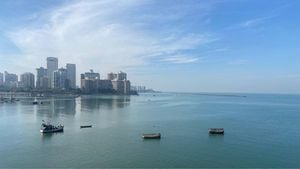On February 24, 2023, the world marks the three-year anniversary of Russia's unexpected and aggressive invasion of Ukraine, which was anticipated to be swift but rather devolved over time. Initially, global observers expected the Russian Army to march through Ukraine with little resistance, but nearly three years later, the reality couldn’t be more different.
The invasion commenced with expectations of Ukrainian capitulation within just days. The U.S. military leadership had previously informed Congress of the likelihood of Kyiv falling within 72 hours of invasion, reinforcing the widespread belief of imminent Russian success. Instead, what followed was persistent Ukrainian resistance and significant Russian defeat.
By the end of the first year alone, Russia had seen its territorial gains begin to wane, having started with approximately 152,000 square kilometers under occupation, including parts of Luhansk and Donetsk. By late 2022, Russian-held territory had significantly shrunk to roughly 105,000 square kilometers, and the current estimates suggest Russia maintains control of only about 113,000 square kilometers.
Despite initial military victories, the Russian campaign's promise of quickly entrenching their control has fizzled out over time. On the front lines, conflict remains stark with substantial human costs on both sides. Ukraine's President Volodymyr Zelenskyy reported approximately 46,000 Ukrainian soldiers have died, and some 390,000 have been wounded. Contrastingly, Russian military officials believe their casualties could also be measured in the hundreds of thousands.
Meanwhile, Russia's intent to showcase its military prowess to sustain national security concerns has only backfired. The original rationale behind the invasion was to curb NATO’s expansion; ironically, this has only galvanized NATO’s resolve, reflected through the pending membership of Sweden and Finland, thereby countering Russia’s initial objective of instilling fear within NATO member states.
EU Council President António Costa visited Kyiv recently, advocating for the appointment of a shared European special envoy to facilitate future peace discussions. He emphasized, "Ich glaube, dass wir unsere europäische Position stärken, wenn wir es schaffen, einen gemeinsamen Sondergesandten zu haben, der nicht nur die Europäische Union, sondern auch die anderen europäischen Länder vertritt" (I believe we can strengthen our European position by having a common special envoy representing not only the European Union but also other European countries). This highlights the urgency of Europe needing to integrate itself firmly within the peace negotiation processes moving forward, alongside valued partners such as Norway, Iceland, and the United Kingdom.
Adding complexity to diplomacy, recent high-stakes discussions between the U.S. and Russia took place as U.S. Secretary of State Marco Rubio met with Russian Foreign Minister Sergey Lavrov. This gathering marks the first of its kind since the beginning of the invasion, indicating potential avenues for dialogue. According to sources, both sides agreed on the necessity to resolve diplomatic disputes surrounding the war, plotting paths toward cessation of hostilities.
Nevertheless, the road to peace remains precarious and fraught with ambiguity. Both Ukrainian leadership and its armed forces remain skeptical, considering the historical backdrop of failed negotiations and Russia’s recurring deceptive tactics during past talks.
The rare opportunity for peace talks appears tempered by Trump's recent comments supporting Putin, raising concerns within Ukraine and allied states about how such sentiments might sway American foreign policy and embolden Russian aggression.
While some speculate Russia might pursue hasty negotiations to legitimize its invasion, the resilience shown by Ukraine's fighters suggests persistent opposition to any agreements perceived as unjust or facilitative of Russian control.
Despite the cumulative losses, Ukraine’s soldiers are undeterred. The Ukrainian ethos has found strength through solidarity and civic pride, unyielding against any authoritarian point of view. For three years, this unwavering resistance has witnessed the formation of national identity amid adversity.
Looking forward, as the anniversary stands as testimony to both sacrifices made and solidarity forged, diplomatic overtures initiated by Europe and engagement levels from the U.S. seem pivotal. Whether these will yield fruitful negotiations, ensuring Ukraine’s sovereignty and security, lies yet to be seen.
The persistence of conflict has not diminished the importance of international alliances and the unified stand against malign aggression. The world witnesses as conversations evolve and peace remains the unfaltering pursuit.



